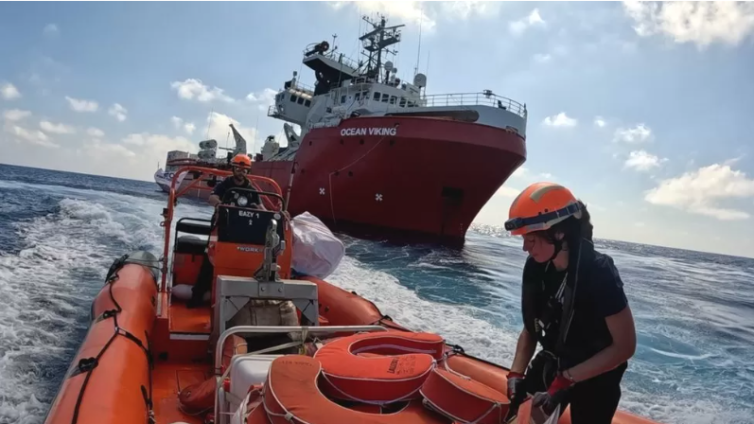Migrants saved in one of the first rescue operations in the Mediterranean since hundreds of people died when a boat sank off the Greek coast, say nothing could deter them from trying to reach Europe. They spoke to the BBC's Alice Cuddy - on board a rescue vessel patrolling the sea for migrant boats in distress.

As the giant red and white rescue ship sails across an expanse of Mediterranean Sea, the horizon is interrupted by the sight of a dark blue inflatable boat, crammed with bobbing heads.
Rescue workers from the charity SOS Mediterranée don helmets and life jackets as they race to the scene in speedboats. They quickly pull the migrants on board the vessels one by one, counting as they go.
The boys and young men, most from The Gambia, have been at sea for 15 hours and have made it 54 nautical miles from the Libyan town of Castelverde, near Tripoli. They are in a state of distress.
Some later tell me that shortly before rescuers arrived, a fight had almost broken out on board the over-packed boat. Some were determined to keep going, while others were begging to give up and try again later. One dropped his phone in the sea in the melee.
One wears the familiar pale blue of a Manchester City football shirt, others are holding iPhones. Few have brought any water or food. Many cannot swim, armed only with the inner tubes of tyres to use as flotation devices should they end up in the sea.
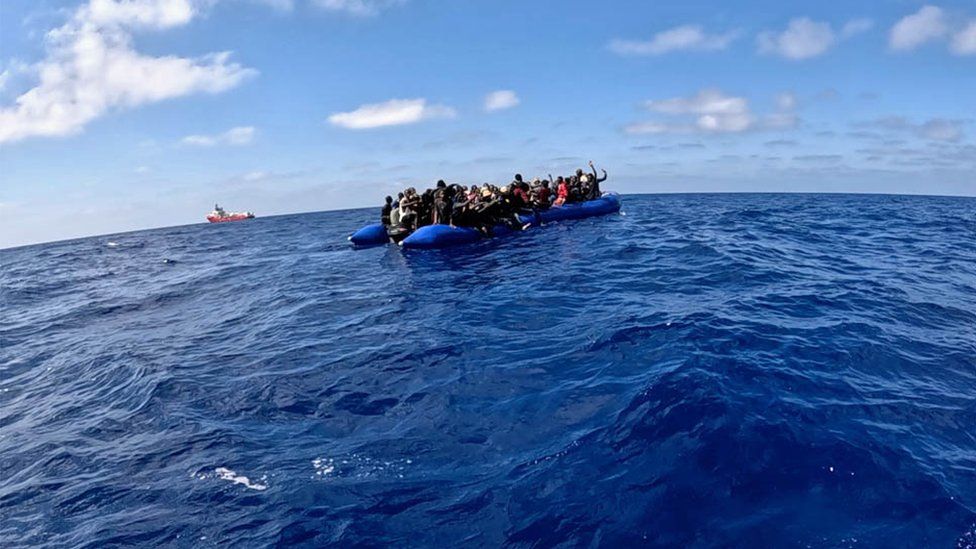
There is panic during the rescue as a Libyan coastguard vessel appears on the horizon. Many of the boys have previously been pulled back to Libya by its coastguard, which the EU has provided with ships, training and funding.
Some of the migrants grin as they sit down in the rescue speedboat - one takes a selfie on his phone. One later tells me that when he grabbed the hand of one of the rescuers, he thought: "Now I have entered Europe."
The group are rushed back to SOS Mediterranée's ship, the Ocean Viking, where they undergo medical checks and receive new clothes and drawstring bags containing supplies like toothbrushes.
The charity alerts Italian authorities, who quickly assign the southern city of Bari as the port at which to disembark, telling them to head there "without delay".
This follows a new law which requires such vessels to immediately head to a port rather than continue to patrol for more migrant boats.
Bari will take almost three days to reach.
So, as we set sail, we speak to some of the migrants in rooms set up as medical facilities and accommodation areas on the deck of the ship. Most speak English - all of their names have been changed.
The migrants tell us they were not ignorant to the risks they were facing. Many say it was not their first attempt at reaching Europe - some had narrowly avoided death, having been picked up from boats in distress and returned to Libya.
"Seven times I have been trying," one 17-year-old says.
Every migrant I speak to has friends who have died attempting the same journey. Some have also been following news on social media of the Greek disaster - one of the deadliest migrant sinkings in years, in which up to 750 people are believed to have died - which happened less than two weeks earlier. Those migrants had also set sail from Libya.
One says it didn't put him off because he believes those migrants would have had the same mindset as him.
"It's either you reach Europe or you die at sea," the teenager tells me. "There's only two options."
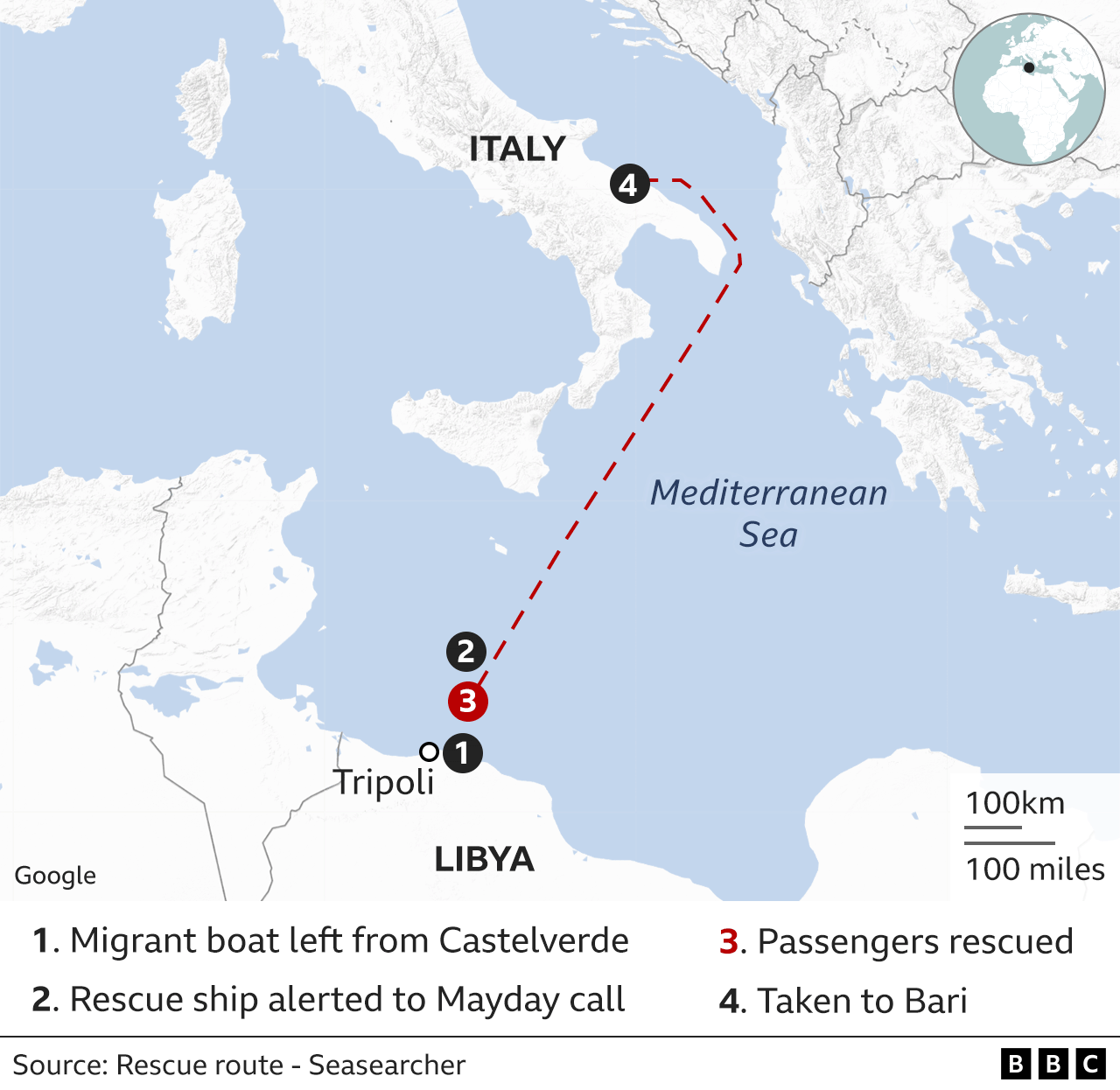
SOS Mediterranée had received an alert about the rubber boat from Alarm Phone, an emergency helpline for migrants in trouble at sea, and European border agency Frontex.
More than 80% of the group are unaccompanied minors, aged under 18. Many of the boys had started their journeys years earlier, when they left home hoping to make money to send back to their families.
Many say they have lost one or both parents and, as the eldest sons in their families, they feel responsible for supporting loved ones.
They are mostly from The Gambia - more than 2,000 miles south and west of Libya.
The Gambia is one of the poorest countries in the world, and the International Organization for Migration (IOM) says Gambians have emigrated at a higher rate per capita than any other nation in Africa in recent years.
It says from 2015 to 2020, more than 32,000 Gambians arrived in Europe through what is known as "irregular" migration. It says a similar number arrived between 2020 and 2022.
The Central Mediterranean is the main migratory route into the European Union. Frontex says that in the first five months of this year, the number of detected crossings more than doubled compared to the same period in 2022 - to 50,318. It is the highest number recorded since 2017.
Relieved to be on the boat and heading to Europe, the boys relax enough to start telling me how they got there.
They took different routes to get to Libya, using networks of smugglers, to cross multiple countries from Africa's west to north coast.
Eighteen-year-old Suma says his journey began when he was put in contact with an "agent" in nearby Mali, with whom he planned the start of his journey to Europe, travelling through Algeria to Libya. Along the way, he says he was tied up, beaten and denied food by smugglers.
No-one he travelled with to Libya was on the boat with him, and the BBC was unable to independently verify his claims - but others have similar stories.
In the time it takes us to reach land, the migrants settle into life on the ship, playing games of football, cards and the game Connect Four - and dancing to music played on a loudspeaker.
There is a moment of excitement when they have the clothes they travelled in returned to them. They sift through a large pile to find their own items and take them over to buckets of soapy water to wash them, before hanging them on ropes to dry.
For many, these clothes are their only personal items - everything else had to be left either back at home or in Libya.
Life on the ship marks a stark change from the way they tell us they had been living before they set sail.
In Libya, they say they lived in compounds run by smugglers as they tried to get the money together for the Mediterranean crossing. Many say this leg of the journey cost them 3,500 Libyan dinars (£570).
Suma's step-dad sent him some of the cash, and another boy says his family had taken out a loan against their business to help fund the journey.
Others make vague references to working for the smugglers.
"This journey, I didn't pay… so I'm very lucky," one said. "I was working with the man. I was helping him arrange things."
Many of the teenagers say they also spent months in Libyan detention centres after being picked up by the Libyan coastguard during attempted crossings - where they say they were tortured and given little food. Many of them have scabies.
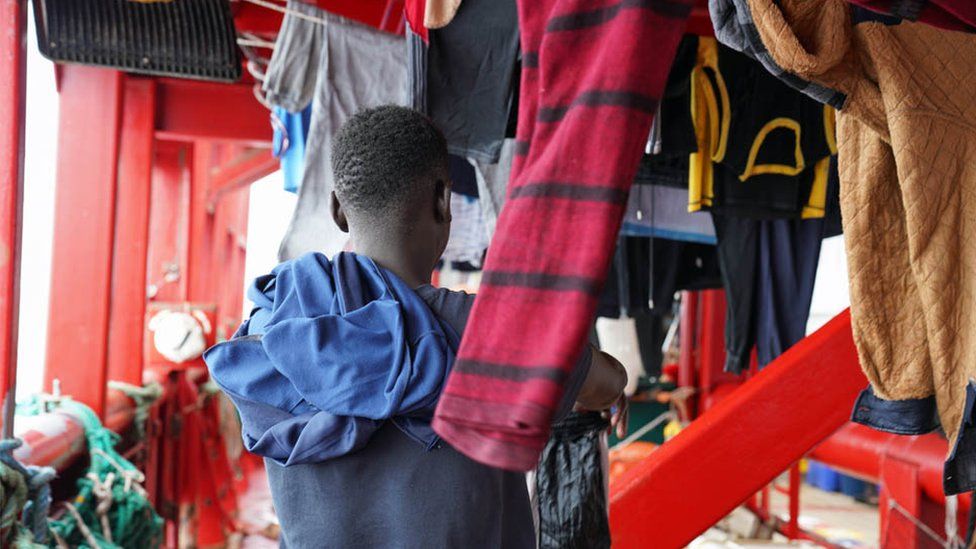
Once they had enough money to cross the Mediterranean, the migrants approached agents to make the arrangements.
Suma says he has learned not to trust them, explaining: "What they will tell you and [what] they will do is a different thing most of the time."
He says he had been previously told he would be transported on a boat with around 55 to 60 people on board, only to find a small rubber raft with 80 to 90 passengers.
"We [just have to] believe, you know, we leave everything in the hands of God. And everyone has to be on that rubber boat," he says.
Adama says he was on a boat holding about 125 occupants that sank - he was one of 94 who survived.
"I just see my friend dying. I help a lot but I cannot help all of them… I see them, they're going."
There is hope among the migrants on board the Ocean Viking as we near the Italian coast, but also some traces of regret. Suma says he misses home, but that it would bring "shame" on him to return after borrowing money from loved ones for the voyage.
"It's a disgrace, you know."
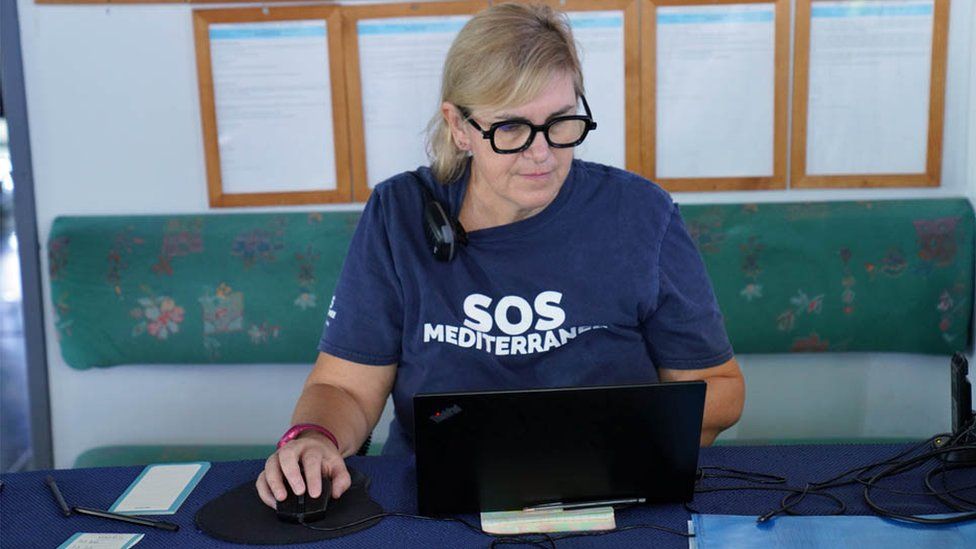
Some knew little about the plan for their dangerous voyage or where it was headed - beyond the promise of Europe - while others had their minds set on landing on the Italian island of Lampedusa, a common arrival point for migrants.
Several also tell us that they had hoped all along to be picked up at sea by SOS Mediterranée's Ocean Viking rescue vessel, never thinking they would make it alone all the way to Italy.
One teenager tells us he was tracking the ship on his phone before setting off.
"I like social media, even the vessel finders, I have all of them on my phone. I will look at the weather, I will look at the rescue ships," he says.
Critics of groups like SOS Mediterranée argue that they act as a pull-factor that encourages migrants to make the dangerous journeys.
However, SOS Mediterranée says numbers of migrant crossings are not affected by whether or not they are on patrol.
"People leave no matter what - ships or no ships," says Claire Juchat, operations communications officer.
She adds that in a 72-hour period following the rescue of the teenagers, when no NGO vessels were on patrol, 5,000 migrants arrived on the island of Lampedusa.
She also notes most rescues are conducted by authorities.
According to figures from the United Nations refugee agency, more than 64,000 people have arrived in Italy after crossing the Central Mediterranean so far this year. More than 1,000 of those have been from The Gambia.
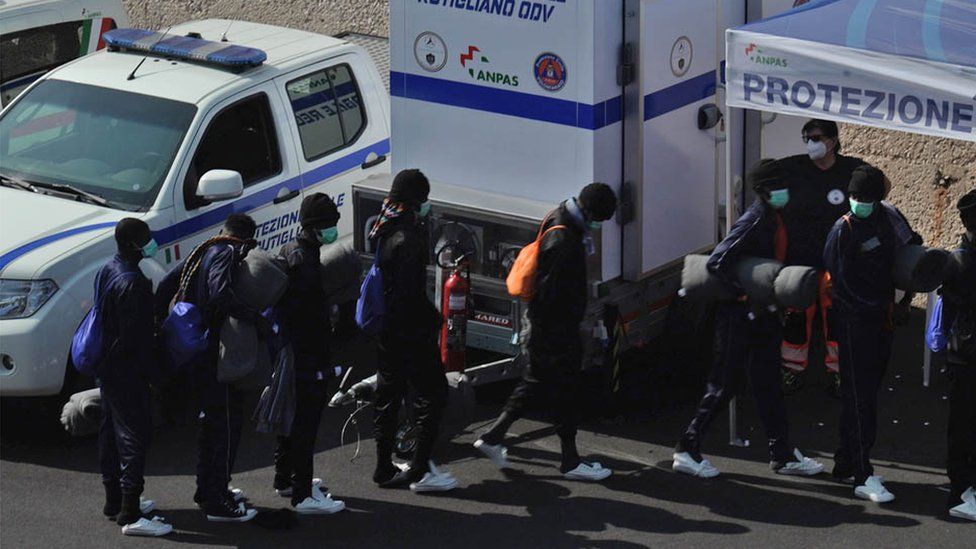
The teenagers tell us they view Europe as a place of safety and stability, where they can return to school and get a good job.
On the ship, the crew give the group a lesson in basic Italian, as they sit on the deck carefully making notes and repeating phrases.
While some have friends who have successfully made the crossing before them and have shared details of their new lives, Europe is mostly an abstract idea for the migrants. Much of their knowledge is based on their favourite football teams and players.
"I want to be a footballer. Like Ronaldo," one says. "Marcus Rashford!" another exclaims. Lots are excited to be disembarking in Italy - the country of the Serie A league, and its new champions Napoli.
But their future remains uncertain.
When the ship docks at the port of Bari, the teenagers, who had earlier been singing and dancing on the deck, go quiet, clutching grey blankets, and documents to present to authorities. Some shake as they wait to be called.
They are greeted at the port by health and border officials, as well as Red Cross and United Nations workers. Some are taken away in paediatric ambulances for health treatment. Others are put in coaches and transported to reception facilities, where they will undergo further assessments.
Sara Mancinelli, operations manager with the International Federation of Red Cross and Red Crescent Societies, on board the vessel, told me that their right to stay in Europe will be determined by their individual circumstances.
"Even if in their country there is no war or persecution, they may have some… reasons why they are recognised for some kind of protection," she says.
Chiara Cardoletti, the UN refugee agency's representative for Italy, says that partly due to a "dramatic upsurge in arrivals" the reception capacity in the country is "currently insufficient to respond to the needs of unaccompanied migrants and others".
As he prepares to take his first step on European soil, Suma turns around and waves goodbye to us.
Latest Stories
-
‘We have missed him for months’ – Arteta on Thomas Partey
6 mins -
Togo heads to polls amid tensions over law reform
8 mins -
Nigerians excited over Harry and Meghan’s planned visit
11 mins -
‘We are sorry but we need to stay calm’ – Andre Ayew on Black Stars recent form
29 mins -
Election 2024: Bawumia dares Mahama to two-man debate
35 mins -
Bawumia is a man of integrity and discipline unlike Mahama – Miracles Aboagye
40 mins -
Ejisu by-election: NDC is sponsoring Aduomi; don’t vote for him – Bawumia to NPP supporters
43 mins -
Freedom of speech must engender development
46 mins -
Ghana Hajj Board announces flight schedules for 2024 pilgrimage
53 mins -
T-bills: Interest rates increased for first time since January 1; government fails to meet target
2 hours -
Ghana retains 10th position with lowest fuel price in Africa
2 hours -
Mahama cuts sod for new Jakpa palace in Damongo
3 hours -
Will Ghana’s democracy stand the test of time in the 2024 elections?
5 hours -
Hindsight: Dreams fairytale run proved one thing; it is possible
7 hours -
God makes rulers, not you; you can’t choose your successor – Mahama to Akufo-Addo
8 hours

